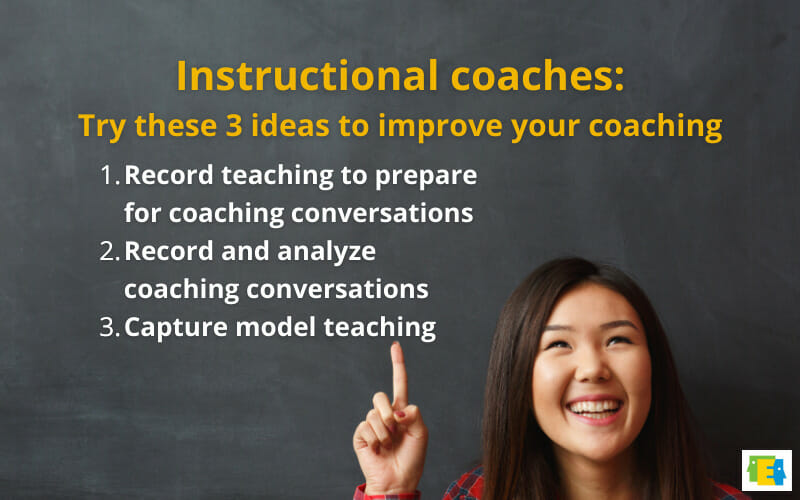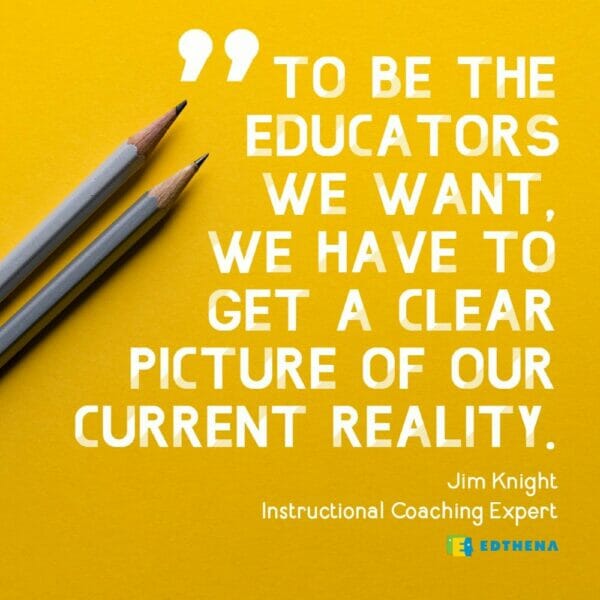3 Ways Instructional Coaches Can Use Video to Improve Teacher Coaching

From educators to athletes, using video to observe your own work is a research-based strategy for improving your performance.
Video coaching and video reflection are becoming more common for instructional coaches’ professional development. It’s easy for coaches to get started using video to improve teacher coaching.
Here are 3 ways instructional coaches can use video to get better at coaching teachers:
- Recording teachers to prepare for coaching conversations
- Recording and analyzing coaching conversations
- Recording coaches’ model teaching
Continue reading for more about each of these three techniques to improve teacher coaching.
How coaches can prepare for effective coaching conversations
Coaching conversations are integral to meaningful teacher coaching, but these conversations need to be prepared for. Teacher coaching expert Elena Aguilar talks about why:
“Planning for a coaching session is essential. After some experience, we might be able to walk into a meeting and wing it, but we will be much more effective if we have a plan tucked into our coach-minds.”
One strategy to prepare for a coaching session is to record classroom video of the teacher.
Watching that video after the lesson enables a coach to more effectively prepare thoughtful questions and determine the right approach for aligning the upcoming coaching conversation to a teacher’s goal.
Coaches should also ask themselves conversation-planning questions such as “What do I anticipate might be challenging for this teacher?” or “Which coaching approach would be the most effective for this conversation?”
Video supports this preparation by giving the coach a clear picture of what is happening in a teacher’s classroom.

Instructional coaches, reflect on coaching conversations more accurately
After a coaching conversation, it can be hard to accurately assess how successfully a teacher’s goals or needs were met. Relying on just memory of how a conversation went is susceptible to bias or misremembering.
Video can serve as the neutral third party: by recording a coaching conversation, teacher coaches can watch what actually happened and analyze how to improve their coaching.
Maybe upon reflection, your coaching was too directive or the conversation didn’t stay focused on one goal.
Coaches can ask themselves coaching reflection questions such as, “How was I actively listening?” or “What do I want to say next time?”
By accurately identifying the strengths and areas for growth within their coaching conversations, instructional coaches can improve teacher coaching.
Coaches should capture model teaching for teachers to learn from
When supporting someone’s learning, whether a student’s or a teacher’s, modeling is important.
Modeling is when someone demonstrates how to implement a skill effectively.
For example, for a teacher working on checking for understanding, an instructional coach could record themselves acting out a variety of questioning techniques.
Student-Centered Coaching author Diane Sweeney says:
“The key is to model what’s needed in the moment, rather than the whole game. When planning the lesson, the coach may ask, ‘What would you like to do? And what would you like me to do?’ For example, a coach may model the send-off at the end of a mini-lesson, demonstrate a few reading conferences, or teach a think-aloud.”
The coach and teacher can then watch a video of the coach’s modeling together to assess what was successful and how the teacher can emulate the practice.
Or, a teacher can watch that recording independently and asynchronously to consider how to incorporate the same skills in their classroom.
Using video strategically can help improve teacher coaching
Video coaching supports both teachers and teacher coaches who want to get better.
However, simply watching a recording without a purpose in mind won’t automatically help improve how coaches are supporting their teachers.
Coaches can use the three ideas outlined above to get started using video for their own professional development in order to have higher-impact coaching interactions with teachers.
Wondering why using video works as professional development for teachers AND instructional coaches? Check out our blog post: 4 Ways Professional Development for Coaches is More Like Teacher PD Than You Think.
